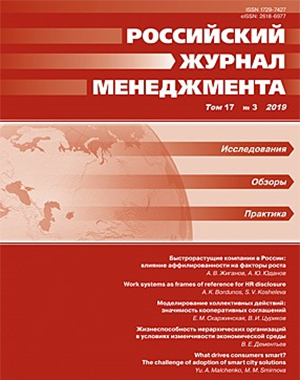Modelling of Collective Actions: The Significance of Cooperative Agreements
DOI:
https://doi.org/10.21638/spbu18.2019.303Abstract
Using mathematical modelling methods, we investigate the collective’s ability to achieve results which are Pareto-dominant over Nash equilibrium. Egoistic urges of the members of the collective, under the law of diminishing returns, give rise to the free-rider problem. Cooperation among agents in an environment where some individuals are characterised by opportunistic tendencies is impaired within a large group due to deficit of trust, yet it is possible within a small group (a coalition) based on interpersonal trust. By deploying a coalitional strategy aimed at maximizing coalitional gains, each individual member of the large group increases their gain. To attain a stable coalition, an agreement must be formed among agents implying adherence to conditions of individual rationality by all members of the collective and compatibility stimuli for all members of the coalition. We further set down the content of such an agreement and calculate side payments that guarantee adherence to conditions necessary for sustainable cooperation, as well as the investment of requisite effort by coalition members.
Keywords:
collective actions, cooperative agreement, trust, coalition, opportunistic behavior, free rider problem
Downloads
References
REFERENCES IN LATIN ALPHABET
Translation of references in Russian into English
Downloads
Published
How to Cite
Issue
Section
License
Articles of the Russian Management Journal are open access distributed under the terms of the License Agreement with Saint Petersburg State University, which permits to the authors unrestricted distribution and self-archiving free of charge.





